英语语法分析-句子成分分析
英语语法--句子成分分析(13张)

Exercises:分析句子结构
1)I am a teacher and I touch the future. 2)He felt happy today. 3)You make my heart smile. 4)he likes playing football. 5)After he finished his homework, he went to school.
名,代,数,不定 式,动名词,短语或 句子 动词或动词词组
We like Tie Zhu
谓语
We like Tie Zhu
宾语
表语
表示动作行为的对象
与联系动词连用,一起构成谓 语,说明主语的性质或特征 用来修饰名词或代词 修饰动词,形容词,副词,表 示动作发生的时间,地点,原 因,目的,方式等 逻辑上与宾语是主谓关系
4)感官系动词 feel, smell, sound, taste 例如:This kind of cloth feels very soft. 注意:系动词不用于被动语态. 5)变化系动词 become, grow, turn, fall, get, go, come, run. 例如: He became mad after that. 。
系动词
1)状态系动词(be动词) 例如: I am a teacher. 2)持续系动词 keep, rest, remain, stay, lie, stand 例如:The key to longevity is that one should keep his breath. 3)表像系动词 seem, appear, look, 例如:He looks tired.
宾语 补足语
形容词,名词,不定 式,介词短语等
英语语法精讲——句子成份分析

第一讲英语的句子结构步骤一:句子结构的解析一、句子成分一个句子一般由两部分组成,即主语部分(subject group)和谓语部分(predicate group)。
句子成分(members of the sentence)是句子中起一定功用的组成部分。
句子由各个成分所构成。
1.主语主语(subject)是一个句子的主题(theme),是全句所述说的主体,一般置于句首。
可用于作主语的有单词、短语、从句乃至句子。
1)名词作主语 e.g. A tree hasfallen across the road.2) 代词作主语 e.g. You’re not far wrong.3) 数词作主语。
e.g. Three is enough.4)名词化的形容词作主语 e.g. The idle are forced to work.5)副词作主语 e.g. Now is the time.6)名词化得介词作主语 e.g. The ups and downs of life must be taken as they come.7) 不定式作主语 e.g. To find your way can be a problem.8)动名词作主语 e.g. Smokingis bad for you.9)名词化的过去分词作主语 e.g. The disabled are to receive more money.10) 介词短语用作主语e.g. From Yenan to Nanniwan was a three-hour ride on horseback.11) 从句用作主语 e.g. Whenever you are ready will be fine. 12) 句子做主语 e.g. “How do you do” is a greeting.主语可由一个以上的名(代)词等构成,这种主语可叫作并列主语。
e.g. He and I are old friends.英语常用无人称的名词作主语。
英语语法——英语句子成分分析

英语语法——英语句子成分分析句子是按照一定的语法规律组成的,表达一个完整的意义。
一个句子一般由两部分构成,即主语部分和谓语部分,这两部分也叫做句子的主要成分。
句子的次要成分包括宾语,定语,状语,表语等。
句子成分是句子中起一定功用的组成部分。
1)主语:是一句的主体,是全句述说的对象,常用名词,数词或代词担任,一般放于句首。
如:Students study. (学生学习。
)We are friends.(我们是朋友)这两句话中单词students是个名词,we是代词,它们在句中做主语。
2)谓语:是对主语加以陈述,表示主语的行为或状态,常用动词或者动词词组担任,放在主语的后面。
如:Students study. (学生学习。
)We are friends. (我们是朋友)这两句话中单词study和are都是动词,study叫做实意动词,are叫做be动词,它们在句中作谓语。
3)宾语:表示行为的对象,常由名词或者代词担任。
放在及物动词或者介词之后。
如:They are teachers. ( 他们是老师。
)I play with him. (我和他一起玩。
)这两句话中单词teachers是名词,单词him是带词,它们在句中作宾语。
4)定语:是用来说明或者限制名词的成分,常用形容词或者相当于形容词的短语或从句担任。
形容词放在名词之前,相当于形容词的短语或从句放在名词的后面。
如:This is a red sun.(这是个红太阳.)He is a tall boy.(他是个高个子男孩。
)这两句话中单词red和tall都是形容词,它们作定语。
5)状语是用来说明动词,形容词,副词或整个句子的成分。
常由副词担任。
修饰动词时可以放在动词之前,也可以放在动词之后;修饰形容词或副词时放在它们之前。
如:The students study hard. (这些学生学习努力。
)I often write to him. (我常给他写信。
(完整版)英语语法分析-句子成分分析

I met my best friend Tom at the ststion yesterday.主语谓语定语宾语同位语状语1 、主语:是一句的主体,是全句诉说的对象,常用名词、数词或代词担任 (是全句谈论的中心话题) 。
例:(1) Students syudy. (名词)(2)We are friends. (代词)(3)To go to good university is his first goal.(不定式)(4)Doing morning exercise is good for your health. (动名词)(5)Jane is good at playing the piano.(6)She went out in a hurry.(7)Four plus four is eight.(8)To see is to believe.(9)Smoking is bad for health.(10)The young should respect the old.(11)What he has said is true.2 、谓语:是对主语加以陈述,表示主语的行为或状态,常用动词或动词词组担任,放在主语的后面(主语做什么了、怎么了) 。
例:(1)Students study. (实意动词)(2)We are friends. (be 动词)(3)We love China.(4)We have finished reading this book.(5)He can speak English. (复合谓语)(6)She seems tired.(7)I saw the flag on the top of the hill.(8)He looked after two orphans.3、宾语:表示行为的对象,常由名词或代词担任,放在及物动词或代词之后 (动作的对象,目标;位于及物动词之后) 。
英语语法英语句子成分分析
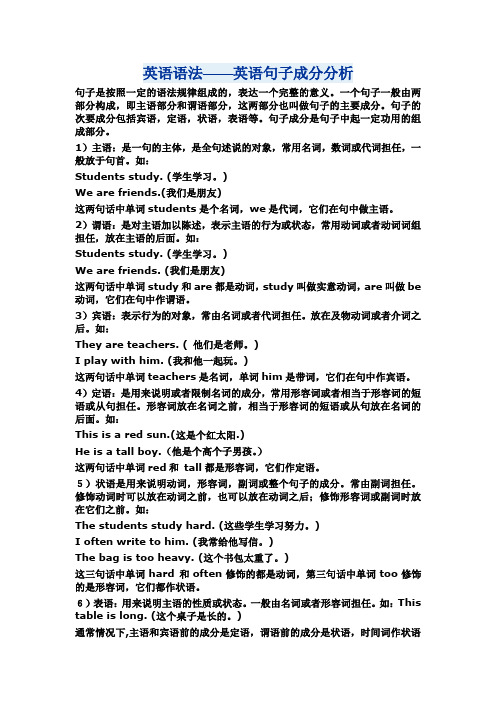
英语语法——英语句子成分分析句子是按照一定的语法规律组成的,表达一个完整的意义。
一个句子一般由两部分构成,即主语部分和谓语部分,这两部分也叫做句子的主要成分。
句子的次要成分包括宾语,定语,状语,表语等。
句子成分是句子中起一定功用的组成部分。
1)主语:是一句的主体,是全句述说的对象,常用名词,数词或代词担任,一般放于句首。
如:Students study. (学生学习。
)We are friends.(我们是朋友)这两句话中单词students是个名词,we是代词,它们在句中做主语。
2)谓语:是对主语加以陈述,表示主语的行为或状态,常用动词或者动词词组担任,放在主语的后面。
如:Students study. (学生学习。
)We are friends. (我们是朋友)这两句话中单词study和are都是动词,study叫做实意动词,are叫做be 动词,它们在句中作谓语。
3)宾语:表示行为的对象,常由名词或者代词担任。
放在及物动词或者介词之后。
如:They are teachers. ( 他们是老师。
)I play with him. (我和他一起玩。
)这两句话中单词teachers是名词,单词him是带词,它们在句中作宾语。
4)定语:是用来说明或者限制名词的成分,常用形容词或者相当于形容词的短语或从句担任。
形容词放在名词之前,相当于形容词的短语或从句放在名词的后面。
如:This is a red sun.(这是个红太阳.)He is a tall boy.(他是个高个子男孩。
)这两句话中单词red和tall都是形容词,它们作定语。
5)状语是用来说明动词,形容词,副词或整个句子的成分。
常由副词担任。
修饰动词时可以放在动词之前,也可以放在动词之后;修饰形容词或副词时放在它们之前。
如:The students study hard. (这些学生学习努力。
)I often write to him. (我常给他写信。
英语语法句子成分分析

英语语法句子成分分析(经典版)编制人:__________________审核人:__________________审批人:__________________编制单位:__________________编制时间:____年____月____日序言下载提示:该文档是本店铺精心编制而成的,希望大家下载后,能够帮助大家解决实际问题。
文档下载后可定制修改,请根据实际需要进行调整和使用,谢谢!并且,本店铺为大家提供各种类型的经典范文,如演讲稿、总结报告、合同协议、方案大全、工作计划、学习计划、条据书信、致辞讲话、教学资料、作文大全、其他范文等等,想了解不同范文格式和写法,敬请关注!Download tips: This document is carefully compiled by this editor. I hope that after you download it, it can help you solve practical problems. The document can be customized and modified after downloading, please adjust and use it according to actual needs, thank you!In addition, this shop provides you with various types of classic sample essays, such as speech drafts, summary reports, contract agreements, project plans, work plans, study plans, letter letters, speeches, teaching materials, essays, other sample essays, etc. Want to know the format and writing of different sample essays, so stay tuned!英语语法句子成分分析英语语法句子成分分析英语语法句子成分是英语的核心,本店铺在这里整理了相关知识,希望能帮助到大家。
英语句子分析
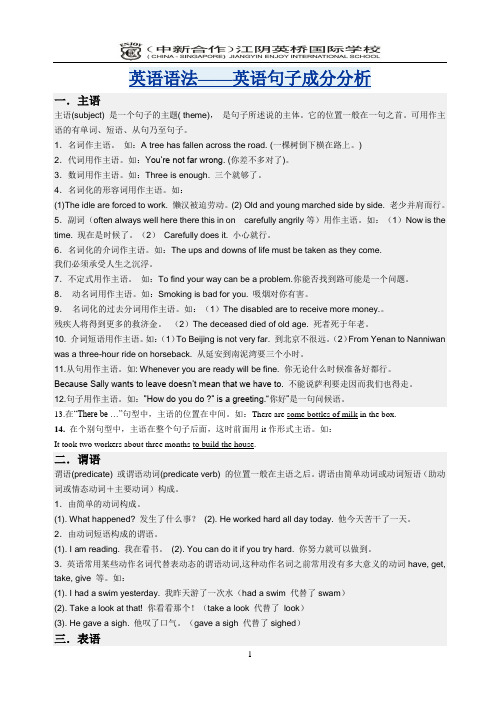
英语语法——英语句子成分分析一.主语主语(subject) 是一个句子的主题( theme),是句子所述说的主体。
它的位置一般在一句之首。
可用作主语的有单词、短语、从句乃至句子。
1.名词作主语。
如:A tree has fallen across the road. (一棵树倒下横在路上。
)2.代词用作主语。
如:You’re not far wrong. (你差不多对了)。
3.数词用作主语。
如:Three is enough. 三个就够了。
4.名词化的形容词用作主语。
如:(1)The idle are forced to work. 懒汉被迫劳动。
(2) Old and young marched side by side. 老少并肩而行。
5.副词(often always well here there this in on carefully angrily等)用作主语。
如:(1)Now is the time. 现在是时候了。
(2)Carefully does it. 小心就行。
6.名词化的介词作主语。
如:The ups and downs of life must be taken as they come.我们必须承受人生之沉浮。
7.不定式用作主语。
如:To find your way can be a problem.你能否找到路可能是一个问题。
8.动名词用作主语。
如:Smoking is bad for you. 吸烟对你有害。
9.名词化的过去分词用作主语。
如:(1)The disabled are to receive more money.。
残疾人将得到更多的救济金。
(2)The deceased died of old age. 死者死于年老。
10. 介词短语用作主语。
如:(1)To Beijing is not very far. 到北京不很远。
(2)From Yenan to Nanniwan was a three-hour ride on horseback. 从延安到南泥湾要三个小时。
英语语法——英语句子成分分析
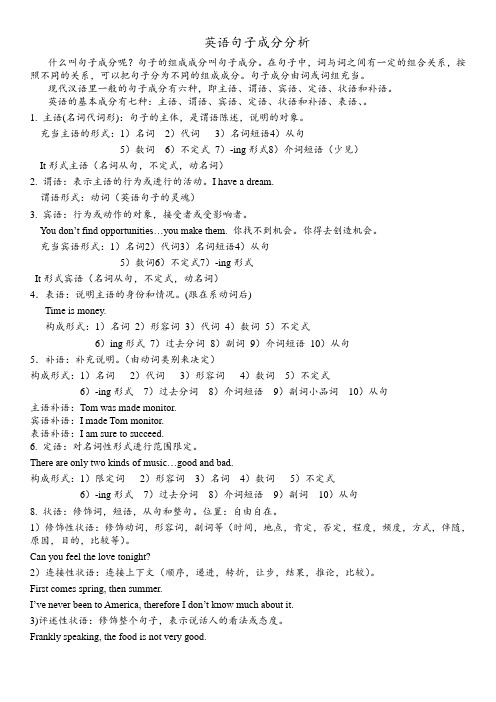
英语句子成分分析什么叫句子成分呢?句子的组成成分叫句子成分。
在句子中,词与词之间有一定的组合关系,按照不同的关系,可以把句子分为不同的组成成分。
句子成分由词或词组充当。
现代汉语里一般的句子成分有六种,即主语、谓语、宾语、定语、状语和补语。
英语的基本成分有七种:主语、谓语、宾语、定语、状语和补语、表语、。
1. 主语(名词代词形):句子的主体,是谓语陈述,说明的对象。
充当主语的形式:1)名词2)代词3)名词短语4)从句5)数词6)不定式7)-ing形式8)介词短语(少见)It形式主语(名词从句,不定式,动名词)2. 谓语:表示主语的行为或进行的活动。
I have a dream.谓语形式:动词(英语句子的灵魂)3. 宾语:行为或动作的对象,接受者或受影响者。
You don’t find opportunities…you make them.你找不到机会。
你得去创造机会。
充当宾语形式:1)名词2)代词3)名词短语4)从句5)数词6)不定式7)-ing形式It形式宾语(名词从句,不定式,动名词)4.表语:说明主语的身份和情况。
(跟在系动词后)Time is money.构成形式:1)名词2)形容词3)代词4)数词5)不定式6)ing形式7)过去分词8)副词9)介词短语10)从句5.补语:补充说明。
(由动词类别来决定)构成形式:1)名词2)代词3)形容词4)数词5)不定式6)-ing形式7)过去分词8)介词短语9)副词小品词10)从句主语补语:Tom was made monitor.宾语补语:I made Tom monitor.表语补语:I am sure to succeed.6. 定语:对名词性形式进行范围限定。
There are only two kinds of music…good and bad.构成形式:1)限定词2)形容词3)名词4)数词5)不定式6)-ing形式7)过去分词8)介词短语9)副词10)从句8. 状语:修饰词,短语,从句和整句。
英语语法——英语句子成分分析

英语语法——英语句子成分分析I.八大成分的概念和构成1.主语(名词代词形):句子的主体,是谓语陈述,说明的对象。
2.谓语:表示主语的行为或进行的活动。
3.宾语:行为或活动的对象,接受者或受影响者。
5.补语:补充说明。
(由动词类别来决定)6.定语:对名词性形式进行范围限定。
7.同位语:对被修饰对象进行补充说明或进一步解释。
8.状语:修饰词,短语,从句和整句。
位置:自由自在。
1)修饰性状语:(时间,地点,肯定,否定,程度,频度,方式,伴随,原因,目的,比较等)。
2)连接性状语:(顺序,递进,转折,让步,结果,推论,比较)。
3)评述性状语:修饰整个句子,表示说话人的看法或态度。
II.成分关系1.补语跟着宾语表语跑:补语跟在宾语和表语的后面构成宾补和表补。
把有宾补的句子变成被动语态,则宾补就变成了主补。
To love others makes us happy…to love ourselves makes us lonely.(宾补)We are made happy to love others…we are made lonely to love ourselves.(主补)爱他人使我们幸福,在自己使我们孤单。
2.定语,同位(语)专把名词踹:定语,同位语修饰名词性形式Experience is the best teacher.(被定语所修饰的形式为名词)They are going to Melbourne, the beautiful city in southern Australia.(同位语所修饰的形式为名词)3.谓语动词由状语修饰When you reach for the stars, you may not quite get one, bu t you won’t come up with a handful of sand either.你想摘下天上的星星,可能一个也摘不下;但也不会一无所获。
(完整版)英语语法分析-句子成分分析

I met my best friend Tom at the ststion yesterday.主语谓语定语宾语同位语状语1、主语:是一句的主体,是全句诉说的对象,常用名词、数词或代词担任(是全句谈论的中心话题)。
例:(1) Students syudy.(名词)(2)We are friends.(代词)(3)To go to good university is his first goal.(不定式)(4)Doing morning exercise is good for your health.(动名词)(5)Jane is good at playing the piano.(6)She went out in a hurry.(7)Four plus four is eight.(8)To see is to believe.(9)Smoking is bad for health.(10)The young should respect the old.(11)What he has said is true.2、谓语:是对主语加以陈述,表示主语的行为或状态,常用动词或动词词组担任,放在主语的后面(主语做什么了、怎么了)。
例:(1)Students study.(实意动词)(2)We are friends.(be动词)(3)We love China.(4)We have finished reading this book.(5)He can speak English.(复合谓语)(6)She seems tired.(7)I saw the flag on the top of the hill.(8)He looked after two orphans.3、宾语:表示行为的对象,常由名词或代词担任,放在及物动词或代词之后(动作的对象,目标;位于及物动词之后)。
宾语分为间接宾语和直接宾语。
2024年初中英语语法一轮复习之句子成分分析

2024年初中英语语法一轮复习之句子成分分析英语语法句子成分分析是指对英语句子中各个成分进行划分和分析,以便更好地理解句子的结构和意义。
以下是一些常见的英语句子成分:主语(Subject):句子中进行动作的人、物或事物。
例如:The dog runs in the park.(狗在公园里跑。
)谓语(Predicate):句子中的动作或状态。
例如:The dog runs in the park.(狗在公园里跑。
)宾语(Object):句子中被动作所影响的人、物或事物。
例如:The dog runs in the park.(狗在公园里跑。
)定语(Adverb):修饰动词、形容词或其他副词,描述它们的性质、状态或特征。
例如:The quick brown fox jumps over the lazy dog.(那只敏捷的棕色狐狸跳过了懒狗。
)状语(Adverbial):对句子中其他部分进行修饰或补充说明的成分。
例如:The quick brown fox jumps over the lazy dog.(那只敏捷的棕色狐狸跳过了懒狗。
)以上是一些常见的英语句子成分,通过对句子成分的分析,可以更好地理解句子的结构和意义。
▲在“There be”句型中,主语通常位于谓语动词之前。
例如:There is a cat on the mat.(垫子上有只猫。
)There are two dogs at the park.(公园里有两只狗。
)在有些情况下,主语的位置可能会发生变化,这取决于句子的语境和意义。
例如:There goes my car!(我的车过去了!)There es the bus.(公交车来了!)在这些例子中,主语“my car”和“bus”的位置发生了变化,这是因为句子的语境和意义需要它们出现在不同的位置。
▲在个别句型中,主语在整个句子后面,这时前面可以用it作形式主语。
例如,在“It is suggested/required/desired/ordered/proposed…that…”的主语从句中,要用虚和语气,即“should+动词原形”,此时应该使用it 作为形式主语。
英语语法——英语句子成分分析
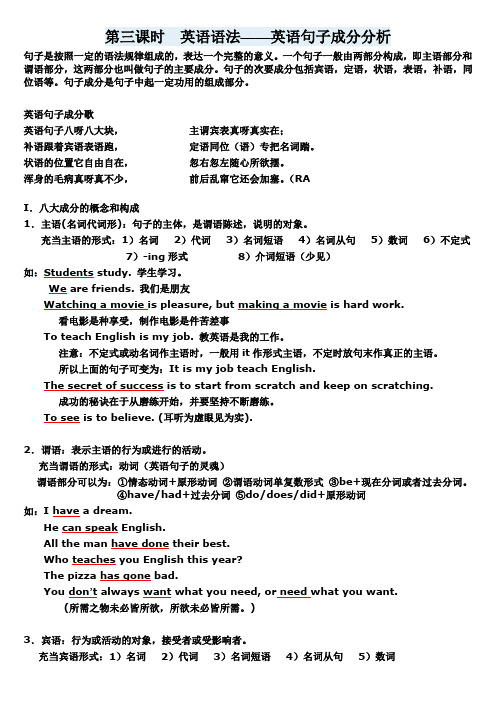
第三课时英语语法——英语句子成分分析句子是按照一定的语法规律组成的,表达一个完整的意义。
一个句子一般由两部分构成,即主语部分和谓语部分,这两部分也叫做句子的主要成分。
句子的次要成分包括宾语,定语,状语,表语,补语,同位语等。
句子成分是句子中起一定功用的组成部分。
英语句子成分歌英语句子八呀八大块,主谓宾表真呀真实在;补语跟着宾语表语跑,定语同位(语)专把名词踹。
状语的位置它自由自在,忽右忽左随心所欲摆。
浑身的毛病真呀真不少,前后乱窜它还会加塞。
(RAI.八大成分的概念和构成1.主语(名词代词形):句子的主体,是谓语陈述,说明的对象。
充当主语的形式:1)名词2)代词3)名词短语4)名词从句5)数词6)不定式7)-ing形式8)介词短语(少见)如:Students study. 学生学习。
We are friends. 我们是朋友Watching a movie is pleasure, but making a movie is hard work.看电影是种享受,制作电影是件苦差事To teach English is my job. 教英语是我的工作。
注意:不定式或动名词作主语时,一般用it作形式主语,不定时放句末作真正的主语。
所以上面的句子可变为:It is my job teach English.The secret of success is to start from scratch and keep on scratching.成功的秘诀在于从磨练开始,并要坚持不断磨练。
To see is to believe. (耳听为虚眼见为实).2.谓语:表示主语的行为或进行的活动。
充当谓语的形式:动词(英语句子的灵魂)谓语部分可以为:①情态动词+原形动词②谓语动词单复数形式③be+现在分词或者过去分词。
④have/had+过去分词⑤do/does/did+原形动词如:I have a dream.He can speak English.All the man have done their best.Who teaches you English this year?The pizza has gone bad.You don’t always want what you need, or need what you want.(所需之物未必皆所欲,所欲未必皆所需。
英语语法句子成分分析

关于英语句子语法分析关于英语句子语法分析一补语英语补语的作用对象是主语和宾语,具有鲜明的定语性描写或限制性功能,在句法上是不可或缺的。
补语是起补充说明作用的成份。
最常见的补语有宾语补足语和主语补足语。
一、宾语补足语适用宾补的句型:主语+谓语+宾语+宾补(S+V+O+OC) 宾补对宾语加以解释或描述。
以下成分可以充当宾补:名词,代词,形容词,副词,ing形式,ed分词,不定式,介词短语,名词性从句。
二、主语补足语主语+动词+形容词(双谓语) 接在动词之后对主语起着解释或描述作用的成分,叫作主补。
关于英语句子语法分析二同位语当两个词或词组在一个句子中具有相同的语法地位而且描述相同的人或事物时,我们称它们为同位语。
同理,当两个指同一人或事物的句子成分放在同等位置时,若其中一个句子成分是用于说明或解释另一个句子成分的,那么用于起说明或解释作用的句子成分就叫做另一成分的同位语。
用法1 由两个或两个以上同一层次的语言单位组成的结构,其中前项与后项所指相同,句法功能也相同,后项是前项的同位语。
Mr. Smith, our new teacher, i very kind to u.我们的新老师史密斯先生对我们很好。
(Mr. Smith是主词our new teacher的同位语,指同一人。
) Yeterday I met Tom, a friend of my brother". 昨天我遇到了我弟弟的朋友汤姆。
a friend of my brother"是受词Tom的同位语,指同一人。
用法2 如同位语与其同位成分关系紧密时不用逗点隔开;如同位语对其同位成分只作补充解释时可用逗点隔开。
He told me that hi brother John i a world-famou doctor. 他本人对我讲,他的兄长约翰是一位世界闻名的医生。
(brother和John都是单一的字作同位语,与其同位成分之间不用逗点隔开。
语法:英语句子成分分析

句子成分分析知识汇总1.简单句五大基本句子结构:S + V主谓结构S + V + P主系(/谓)表结构S + V + O主谓宾结构S + V + O1 + O2主谓双宾结构S + V + O + C主谓宾补结构2.主语(Subject,缩写为S):可以理解为动作的发起人,或是句子陈述的主体。
主语是一句话的中心,表示所说的是谁或是什么,其位置一般放在句首,无特殊情况英语中主语一般不省略。
可以作主语成分的包括名词,代词,形容词,分词,数词等,以及动词不定式或不定式短语,从句,某些固定词组。
3.表语(Predicative,缩写为P):用来修饰主语,说明主语的身份、性质、品性、特征和状态的,表语位于系动词之后,与系动词联系十分紧密,有系动词就有表语,有表语就有系动词。
通常由名词、形容词、副词、介词短语、不定式、动词的-ing、从句来充当。
表语就是起表述作用的句子成分。
4.系动词,又称连系动词(Linking Verb,缩写为LV):用来辅助主语的动词。
它本身有词义,但不能单独用作谓语,其后必须跟表语,构成系表结构说明主语的状况、性质、特征等情况。
在英语中,系动词的功能主要是把表语和它的主语联系在一起,说明主语的性质、特征、品性或状态。
它有自己的但不完全的词义,不能在句中独立作谓语,必须和后面的表语一起构成句子的谓语。
5.系动词的主要分类:①状态系动词:用来表示主语状态→be动词②持续系动词:用来表示主语继续或保持一种状况或态度→keep, remain, stay, lie, stand③表像系动词:用来表示“看起来像”概念→seem, appear, look④感官系动词→look,feel, smell, sound, taste⑤变化系动词:表示主语变成什么样→become, grow, turn, fall, get, go, come, run⑥终止系动词:表示主语已终止动作→prove, turn out6.谓语(Predicate):可以理解为对主语动作状态或特征的陈述或说明,指出主语做什么、是什么。
英语语法——英语句子成分分析
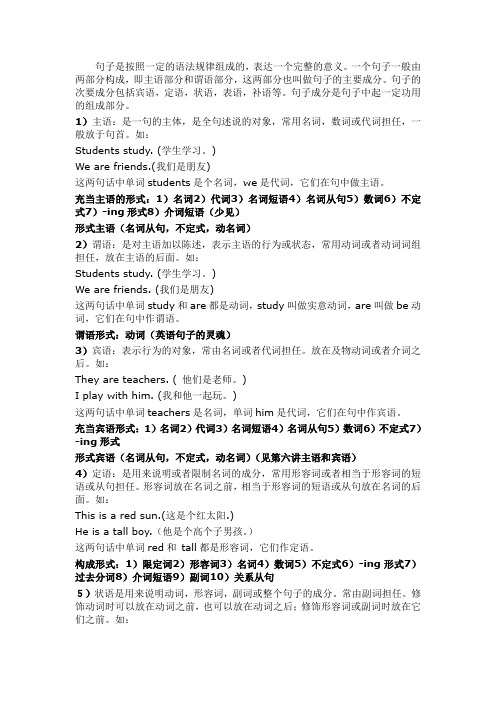
句子是按照一定的语法规律组成的,表达一个完整的意义。
一个句子一般由两部分构成,即主语部分和谓语部分,这两部分也叫做句子的主要成分。
句子的次要成分包括宾语,定语,状语,表语,补语等。
句子成分是句子中起一定功用的组成部分。
1)主语:是一句的主体,是全句述说的对象,常用名词,数词或代词担任,一般放于句首。
如:Students study. (学生学习。
)We are friends.(我们是朋友)这两句话中单词students是个名词,we是代词,它们在句中做主语。
充当主语的形式:1)名词2)代词3)名词短语4)名词从句5)数词6)不定式7)-ing形式8)介词短语(少见)形式主语(名词从句,不定式,动名词)2)谓语:是对主语加以陈述,表示主语的行为或状态,常用动词或者动词词组担任,放在主语的后面。
如:Students study. (学生学习。
)We are friends. (我们是朋友)这两句话中单词study和are都是动词,study叫做实意动词,are叫做be动词,它们在句中作谓语。
谓语形式:动词(英语句子的灵魂)3)宾语:表示行为的对象,常由名词或者代词担任。
放在及物动词或者介词之后。
如:They are teachers. ( 他们是老师。
)I play with him. (我和他一起玩。
)这两句话中单词teachers是名词,单词him是代词,它们在句中作宾语。
充当宾语形式:1)名词2)代词3)名词短语4)名词从句5)数词6)不定式7)-ing形式形式宾语(名词从句,不定式,动名词)(见第六讲主语和宾语)4)定语:是用来说明或者限制名词的成分,常用形容词或者相当于形容词的短语或从句担任。
形容词放在名词之前,相当于形容词的短语或从句放在名词的后面。
如:This is a red sun.(这是个红太阳.)He is a tall boy.(他是个高个子男孩。
)这两句话中单词red和tall都是形容词,它们作定语。
英语语法分析句子成分分析
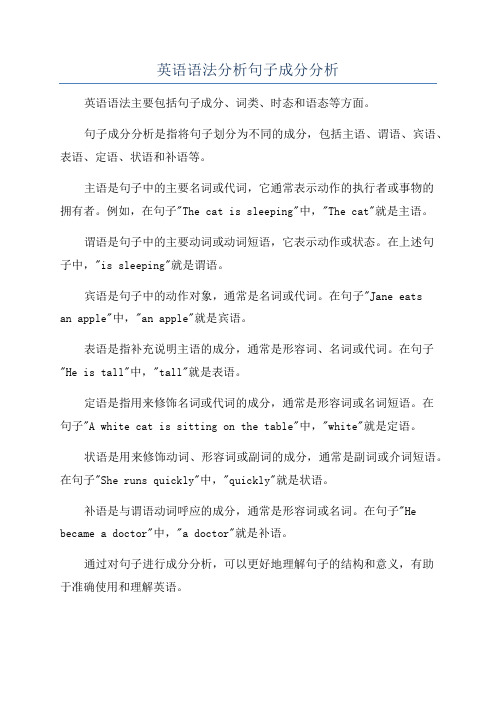
英语语法分析句子成分分析英语语法主要包括句子成分、词类、时态和语态等方面。
句子成分分析是指将句子划分为不同的成分,包括主语、谓语、宾语、表语、定语、状语和补语等。
主语是句子中的主要名词或代词,它通常表示动作的执行者或事物的拥有者。
例如,在句子"The cat is sleeping"中,"The cat"就是主语。
谓语是句子中的主要动词或动词短语,它表示动作或状态。
在上述句子中,"is sleeping"就是谓语。
宾语是句子中的动作对象,通常是名词或代词。
在句子"Jane eatsan apple"中,"an apple"就是宾语。
表语是指补充说明主语的成分,通常是形容词、名词或代词。
在句子"He is tall"中,"tall"就是表语。
定语是指用来修饰名词或代词的成分,通常是形容词或名词短语。
在句子"A white cat is sitting on the table"中,"white"就是定语。
状语是用来修饰动词、形容词或副词的成分,通常是副词或介词短语。
在句子"She runs quickly"中,"quickly"就是状语。
补语是与谓语动词呼应的成分,通常是形容词或名词。
在句子"He became a doctor"中,"a doctor"就是补语。
通过对句子进行成分分析,可以更好地理解句子的结构和意义,有助于准确使用和理解英语。
英语语法 句子成分分析
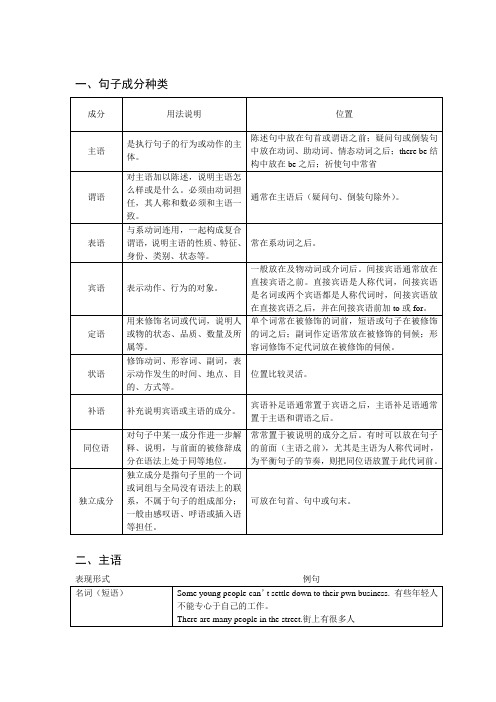
Ih is always helpingthe poor.她总是帮助穷人。
不定式(短语)
He refusedto help her.他拒绝帮助她。
动名词(短语)
Mary enjoyspalying the piano.玛丽喜欢弹钢琴。
从句
Iam not certainif the plane will arrivre on time.
时间状语
I usually go to workat 8:00 in the morning.我通常早上八点去上班。
原因状语
Not having received areply, he wrote a second letter.因为没有收到回信,他又写了一封信。
地点状语
Qingdao liesin the east of China.青岛位于中国东部。
数词
Two will be enough.两个就够了。
Two plus eight is ten.二加八等于十。
动词不定式(短语)
To swim in this river is dangerous.在这条河里游泳很危险。
To improve the soil need a lot of money.改善土壤需要很多钱。
The old should be respected.老年人应受到尊敬。
从句
That he will come to the conference has excited every one of us.他要来参加会议使我们每一个人都十分激动。
Who will go makes no difference.谁去都没关系。
表语
与系动词连用,一起构成复合谓语,说明主语的性质、特征、身份、类别、状态等。
英语句子成分分析(最完整版)
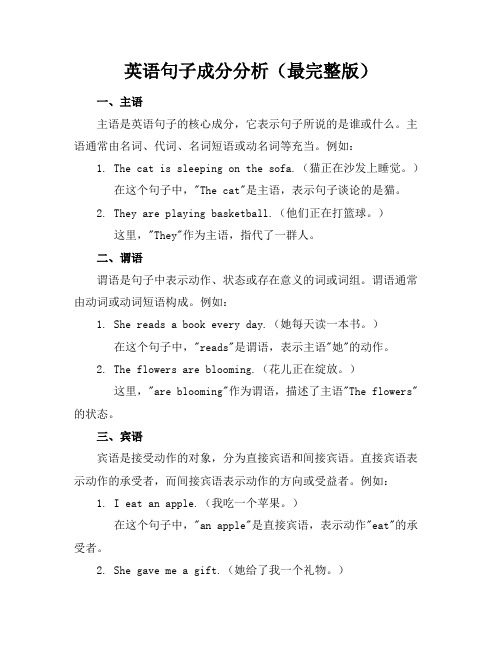
英语句子成分分析(最完整版)一、主语主语是英语句子的核心成分,它表示句子所说的是谁或什么。
主语通常由名词、代词、名词短语或动名词等充当。
例如:1. The cat is sleeping on the sofa.(猫正在沙发上睡觉。
)在这个句子中,"The cat"是主语,表示句子谈论的是猫。
2. They are playing basketball.(他们正在打篮球。
)这里,"They"作为主语,指代了一群人。
二、谓语谓语是句子中表示动作、状态或存在意义的词或词组。
谓语通常由动词或动词短语构成。
例如:1. She reads a book every day.(她每天读一本书。
)在这个句子中,"reads"是谓语,表示主语"她"的动作。
2. The flowers are blooming.(花儿正在绽放。
)这里,"are blooming"作为谓语,描述了主语"The flowers"的状态。
三、宾语宾语是接受动作的对象,分为直接宾语和间接宾语。
直接宾语表示动作的承受者,而间接宾语表示动作的方向或受益者。
例如:1. I eat an apple.(我吃一个苹果。
)在这个句子中,"an apple"是直接宾语,表示动作"eat"的承受者。
2. She gave me a gift.(她给了我一个礼物。
)这里,"a gift"是直接宾语,表示动作"gave"的承受者;"me"是间接宾语,表示动作的方向。
四、表语表语用来补充说明主语的身份、特征或状态,通常位于系动词(如be、look、seem等)之后。
例如:1. He is a teacher.(他是一名教师。
)在这个句子中,"a teacher"是表语,说明主语"He"的身份。
英语语法分析-句子成分分析
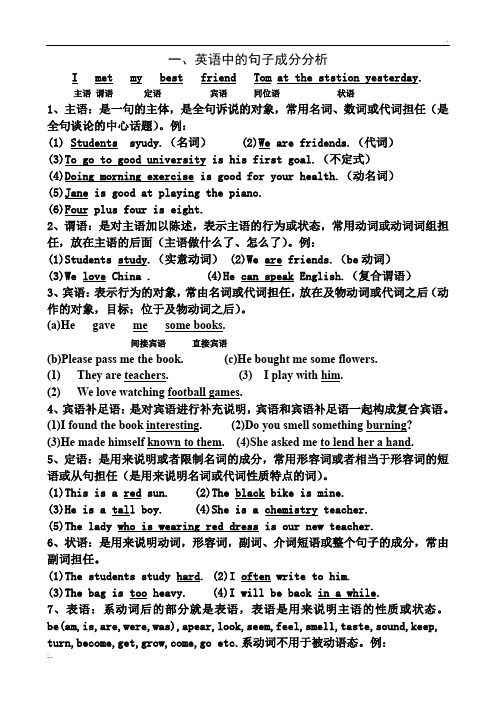
一、英语中的句子成分分析I met my best friend Tom at the ststion yesterday.主语谓语定语宾语同位语状语1、主语:是一句的主体,是全句诉说的对象,常用名词、数词或代词担任(是全句谈论的中心话题)。
例:(1) Students syudy.(名词) (2)We are fridends.(代词)(3)To go to good university is his first goal.(不定式)(4)Doing morning exercise is good for your health.(动名词)(5)Jane is good at playing the piano.(6)Four plus four is eight.2、谓语:是对主语加以陈述,表示主语的行为或状态,常用动词或动词词组担任,放在主语的后面(主语做什么了、怎么了)。
例:(1)Students study.(实意动词) (2)We are friends.(be动词)(3)We love China . (4)He can speak English.(复合谓语)3、宾语:表示行为的对象,常由名词或代词担任,放在及物动词或代词之后(动作的对象,目标;位于及物动词之后)。
(a)He gave me some books.间接宾语直接宾语(b)Please pass me the book. (c)He bought me some flowers.(1)They are teachers. (3) I play with him.(2)We love watching football games.4、宾语补足语:是对宾语进行补充说明,宾语和宾语补足语一起构成复合宾语。
(1)I found the book interesting. (2)Do you smell something burning?(3)He made himself known to them. (4)She asked me to lend her a hand.5、定语:是用来说明或者限制名词的成分,常用形容词或者相当于形容词的短语或从句担任(是用来说明名词或代词性质特点的词)。
- 1、下载文档前请自行甄别文档内容的完整性,平台不提供额外的编辑、内容补充、找答案等附加服务。
- 2、"仅部分预览"的文档,不可在线预览部分如存在完整性等问题,可反馈申请退款(可完整预览的文档不适用该条件!)。
- 3、如文档侵犯您的权益,请联系客服反馈,我们会尽快为您处理(人工客服工作时间:9:00-18:30)。
met my _best friend Tom at the ststion yesterday. ______________主语谓语定语宾语同位语状语1、主语:是一句的主体,是全句诉说的对象,常用名词、数词或代词担任(是全句谈论的中心话题)。
例:(I) Students syudy. (名词)⑵We are frie nds. (代词)(3) To go to good uni versity is his first goal. (不定式)(4) Doing morning exercise is good for your health. (动名词)(5) Jane is good at play ing the pia no.(6) She went out in a hurry.(7) Four plus four is eight.(8) To see is to believe.(9) Smoking is bad for health.(10) The young should respect the old.(II) What he has said is true.2、谓语:是对主语加以陈述,表示主语的行为或状态,常用动词或动词词组担任,放在主语的后面(主语做什么了、怎么了)。
例:(1) Stude nts study. (实意动词)⑵We are frie nds. (be 动词)(3) We love China.(4) We have finished reading this book.(5) He can speak E nglish. (复合谓语)(6) She seems tired.(7) I saw the flag on the top of the hill.(8) He looked after two orphans.3、宾语:表示行为的对象,常由名词或代词担任,放在及物动词或代词之后(动作的对象,目标;位于及物动词之后)。
宾语分为间接宾语和直接宾语。
直接宾语指物,间接宾语指人。
例:(a) He gave me some books.间接宾语直接宾语(b) Please pass me the book.(c) He bought me some flowers.(1) They are teachers.(2) I play with him.(3) We love watching football games.(4) He is dong her homework now.(5) I like my job.(6) I love you.(7) He wan ted to leave here.(8) They enjoyed play ing football games.注:位于介词之后的成分也称之为宾语。
4、宾语补足语:是对宾语进行补充说明,宾语和宾语补足语一起构成复合宾语。
例:(1) 1 found the book interesting.(2) Do you smell somethi ng burning?(3) He made himself known to them.(4) She asked me to lend her a hand.(5) Please make yourself at home.(6) Please keep the dog out.(7) We must keep it a secret.主动语态变成被动语态后,宾语补足语变成主补。
例:(1) 1 last saw him play ing n ear the river—He was last seen play ing n ear the river.(2) The teacher caught the student cheati ng in the exam.—The stude nt was caught cheati ng in the exam.(3) We made him monitor.—He was made monitor.(4) He pushed the dooroper—The door was pushed_ope n.5、定语:是用来说明或者限制名词的成分,常用形容词或者相当于形容词的短语或从句担任(是用来说明名词或代词性质特点的词)。
形容词放在名词前,相当于形容词的短语或从句放在名词之后。
例:(1) This is a red sun.(2) The black bike is mine.(3) He is a tall boy.(4) She is a chemistry teacher.(5) The man in bllue is my brother.(6) The girl playing the pia no is my y oun ger sister.(7) The lady who is weari ng red dress is our new teacher.6、状语:是用来说明动词,形容词,副词、介词短语或整个句子的成分,常由副词担任。
修饰动词的可以放在动词之前,也可以放在动词之后;修饰形容词或副词的放在它们之前。
例:(1) The stude nts study har _(2) 1 often write to him.(3) The bag is too_heavy.(4) 1 will be back in a while. ___(5) They are play ing on the playgro und.(6) He was late because he got up late. ___(7) He got up so late that he missed the train. ______(8) 1 waited to see you.(9) He ofte n went to school by bu ___(10) His parents died,leaving him an orphan. ____(11) Please call me if it is necessary. _____(12) This book is very interesti ng.(13) He went to school in spite of his illness. _______(14) He always comes late to school.7、表语:系动词后的部分就是表语,表语是用来说明主语的性质或状态。
一般由名词或者形容词担任。
常见的系动词有:be(am,is,are,were,was),aapear,look,seemfeel,smell,taste,so un d,keep,turn,become,get,grow,come,go etc. 系动词不用于被动语态。
例:(1) This table is long ___(2) The apple tastes sweet.(3) The war was over.(4) They seem to know the truth.(5) Time is precious.(6) I ' m not quite myself today.(7) Who was the first?(8) He is out of con diti on.(9) The book is what I need.通常情况下,主语和宾语前的成分是定语,谓语前的成分是状语,时间作状语放在句子的后面。
(定语)主语(状语)谓语(定语)宾语(状语)。
(1) (The tall)boy(ofte n)go(to the big)zoo.(2) (The happy)child-we nt(his)home yesterday.英语句子成分歌:英语句子八呀八大块,主谓宾表真呀真实在;补语跟着宾语标语跑,定语同位(语)专把名词踹。
状语的位置它自由自在,忽右忽左随心所欲摆。
浑身的毛病真呀真不少,前后乱窜它还会加塞。
二、从句从句是相对于主句而言的,即它是从属于某一个主句,而不能单独做一个 句子。
英语中主要有三大从句,即名词性从句(包括主语从句,定语从句,表 语从句,同位语从句)、形容词性从句(即定语从句)、副词性从句(即状语从 句,包括时间,结果,条件,目的,原因,让步,地点,方式等)1、 主从作主语,例:That the earth is round is truth.2、 宾从作宾语,例:Do you kn ow where he lives?3、 表从左表语,:My opinion is that you should not go alone.(一)主语从句、1定义:作句子主语的从句叫做主语从句2、引导词:主语从句通常由从属连词that,whether,if 和连接代词基本句型四基本句型五英语五种基本句型:基本句型一 基本句型二 S+VS+V+P (主+谓) ( 主+系+表)what,who,which,whatever,whoever以及连接畐U词how,when,where,why等词引导,that在句中无词义,只起连接作用;连接代词和连接副词在句中既保留自己的疑问含义、又起连接作用,在从句中充当从句的成分。
例:(1) What he wants to tell us is n ot clea他要跟我们说什么,还不清楚。
⑵Who will won the match is still unknown.谁能赢得这场比赛还不得而知。
(3) lt is known to us how he became a writer我们都知道他是如何成为一名作家的。
(4) Where the English evening will be held is has not yet been announced.英语晚会将在那里举行,还没有宣布。
二、1、找主语从句时,先找到句子的谓语,主句的谓语前面的从句,就是主语从句。
(1) Why he left wasn't important.主语从句主句的谓语动词(2) That he became an artist may have bee n due to her father's influence.主语从句主句的谓语动词2、that引导的主语从句可以放在主语的位置,这时that不可省略。
例:That prices will go up is certa in.3、that主语从句放在句首的情况不是很常见,绝大部分主语从句都借助形式主语it,主语从句放在后面。
